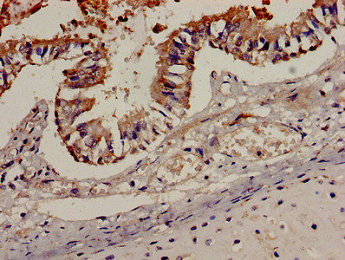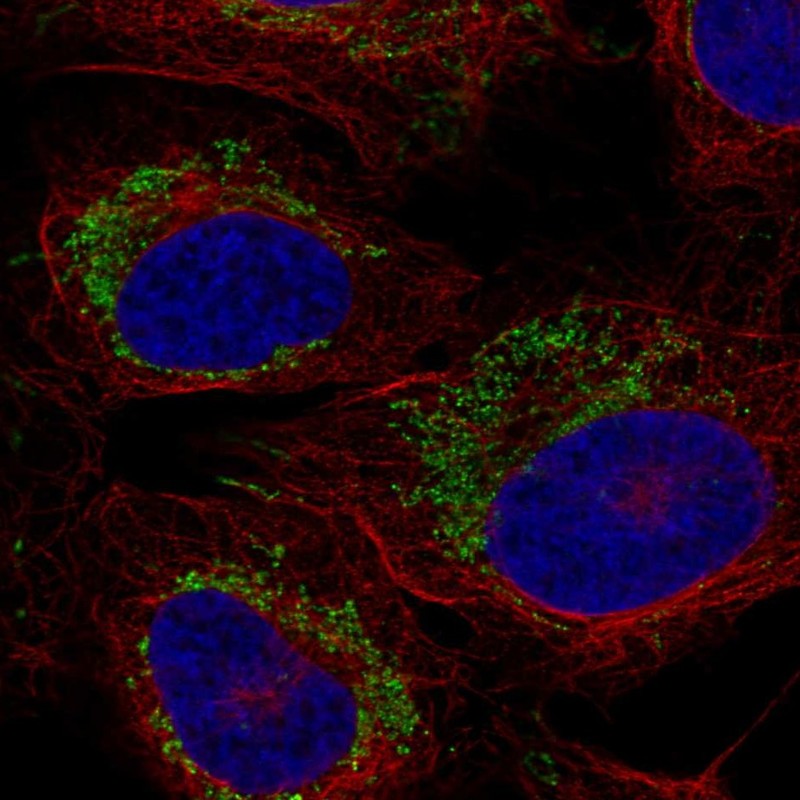![CCR7 antibody [HL3075] detects CCR7 protein by immunohistochemical analysis. Sample: Paraffin-embedded rat spleen. CCR7 stained by CCR7 antibody [HL3075] (GTX640521) diluted at 1:100. Antigen Retrieval: Citrate buffer, pH 6.0, 15 min CCR7 antibody [HL3075] detects CCR7 protein by immunohistochemical analysis. Sample: Paraffin-embedded rat spleen. CCR7 stained by CCR7 antibody [HL3075] (GTX640521) diluted at 1:100. Antigen Retrieval: Citrate buffer, pH 6.0, 15 min](https://www.genetex.com/upload/website/prouct_img/normal/GTX640521/GTX640521_T-45446_20240729_IHC-P_R_24081300_944.webp)
CCR7 antibody [HL3075] detects CCR7 protein by immunohistochemical analysis. Sample: Paraffin-embedded rat spleen. CCR7 stained by CCR7 antibody [HL3075] (GTX640521) diluted at 1:100. Antigen Retrieval: Citrate buffer, pH 6.0, 15 min
CCR7 antibody [HL3075]
GTX640521
ApplicationsImmunoHistoChemistry, ImmunoHistoChemistry Paraffin
Product group Antibodies
ReactivityHuman, Rat
TargetCCR7
Overview
- SupplierGeneTex
- Product NameCCR7 antibody [HL3075]
- Delivery Days Customer7
- Application Supplier NoteIHC-P: 1:100-1:1000. *Optimal dilutions/concentrations should be determined by the researcher.Not tested in other applications.
- ApplicationsImmunoHistoChemistry, ImmunoHistoChemistry Paraffin
- CertificationResearch Use Only
- ClonalityMonoclonal
- Clone IDHL3075
- Concentration1 mg/ml
- ConjugateUnconjugated
- Gene ID1236
- Target nameCCR7
- Target descriptionC-C motif chemokine receptor 7
- Target synonymsBLR2, CC-CKR-7, CCR-7, CD197, CDw197, CMKBR7, EBI1, C-C chemokine receptor type 7, Bukitt's lymphoma receptor 2, CC chemokine receptor 7, EBV-induced G protein-coupled receptor 1, Epstein-Barr virus induced gene 1, Epstein-Barr virus-induced G-protein coupled receptor 1, MIP-3 beta receptor, chemokine (C-C motif) receptor 7, lymphocyte-specific G protein-coupled peptide receptor
- HostRabbit
- IsotypeIgG
- Protein IDP32248
- Protein NameC-C chemokine receptor type 7
- Scientific DescriptionThe protein encoded by this gene is a member of the G protein-coupled receptor family. This receptor was identified as a gene induced by the Epstein-Barr virus (EBV), and is thought to be a mediator of EBV effects on B lymphocytes. This receptor is expressed in various lymphoid tissues and activates B and T lymphocytes. It has been shown to control the migration of memory T cells to inflamed tissues, as well as stimulate dendritic cell maturation. The chemokine (C-C motif) ligand 19 (CCL19/ECL) has been reported to be a specific ligand of this receptor. Signals mediated by this receptor regulate T cell homeostasis in lymph nodes, and may also function in the activation and polarization of T cells, and in chronic inflammation pathogenesis. Alternative splicing of this gene results in multiple transcript variants. [provided by RefSeq, Sep 2014]
- ReactivityHuman, Rat
- Storage Instruction-20°C or -80°C,2°C to 8°C
- UNSPSC41116161

![Unboiled non-transfected (–) and transfected (+) 293T whole cell extracts (30 μg) were separated by 10% SDS-PAGE, and the membrane was blotted with CCR7 antibody [HL3075] (GTX640521) diluted at 1:5000. The HRP-conjugated anti-rabbit IgG antibody (GTX213110-01) was used to detect the primary antibody. Unboiled non-transfected (–) and transfected (+) 293T whole cell extracts (30 μg) were separated by 10% SDS-PAGE, and the membrane was blotted with CCR7 antibody [HL3075] (GTX640521) diluted at 1:5000. The HRP-conjugated anti-rabbit IgG antibody (GTX213110-01) was used to detect the primary antibody.](https://www.genetex.com/upload/website/prouct_img/normal/GTX640521/GTX640521_45537_20250510_WB_multiple_B_25051420_613.webp)





